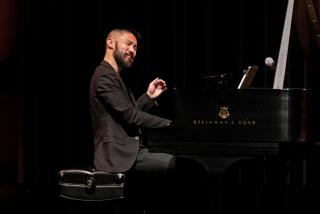Music Reviews : McKelway, Bush Open Gold Medal Series
- Share via
It took courage and pluck for clarinetist Daniel McKelway to play an entire recital with pianist Phillip Bush with the piano lid wide open when the duo opened the 1991-92 Gold Medal series at Ambassador Auditorium.
But courage and pluck are what virtuosity is all about--and young McKelway is nothing if not a virtuoso.
He proved himself so throughout a generous and varied program in the Pasadena showplace Monday night when he and Bush played music by Debussy, Schumann, Messiaen, Leonard Bernstein, Brahms and Verdi with terrific aplomb and only one false move. And, as regards balances, those emerged perfectly and naturally gauged.
The duo stressed the musical values in all these works, eschewing overt display aspects until the end. Yet display there was, throughout, in the form of instrumental resourcefulness, wide dynamic and stylistic ranges and abundant expressivity. Here was plenty of show; more important, here was consistently communicative playing--until the end.
Some of McKelway-Bush’s listeners would say the best was first, in the duo’s subtle and sensuous, but clearly apprehendable, performance of Debussy’s “Premiere Rapsodie.” Others would cite Brahms’ F-minor Sonata--inspired, articulate, intense, yet classically restrained--as the high point.
Still others might find the solo-clarinet movement from Messiaen’s “Quatuor pour la fin du temps” McKelway’s most poignant moment.
Real connoisseurs might prefer his understated, lyrical and breezy reading of Bernstein’s irrepressible Sonata (1941), accomplished with the affectionate cooperation of Bush, a pianist of exceptional, cherishable finesse.
What was certainly not the duo’s finest performance was their recital-closing “Concert Fantasia on Motives From Verdi’s ‘Rigoletto’ ” by Luigi Bassi.
This may not be a masterpiece, but it can be effective; it was at least that in McKelway’s game meeting of all technical challenges.
But it lacked style to the point where one wondered if either the clarinetist or the pianist had ever witnessed a performance of this opera--or even heard it on recordings--so cavalier, mechanical and insensitive to Verdi’s music did they prove to be.
More to Read
The biggest entertainment stories
Get our big stories about Hollywood, film, television, music, arts, culture and more right in your inbox as soon as they publish.
You may occasionally receive promotional content from the Los Angeles Times.










